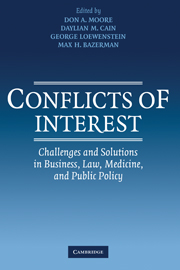Book contents
- Frontmatter
- Contents
- List of Contributors
- Acknowledgments
- Introduction
- PART ONE BUSINESS
- PART TWO MEDICINE
- PART THREE LAW
- PART FOUR PUBLIC POLICY
- 17 Conflicts of Interest in Public Policy Research
- 18 Commentary: Conflicts of Interest in Policy Analysis: Compliant Pawns in Their Game?
- 19 Conflict of Interest as an Objection to Consequentialist Moral Reasoning
- 20 Commentary: Conflict of Interest as a Threat to Consequentialist Reasoning
- Index
17 - Conflicts of Interest in Public Policy Research
Published online by Cambridge University Press: 04 August 2010
- Frontmatter
- Contents
- List of Contributors
- Acknowledgments
- Introduction
- PART ONE BUSINESS
- PART TWO MEDICINE
- PART THREE LAW
- PART FOUR PUBLIC POLICY
- 17 Conflicts of Interest in Public Policy Research
- 18 Commentary: Conflicts of Interest in Policy Analysis: Compliant Pawns in Their Game?
- 19 Conflict of Interest as an Objection to Consequentialist Moral Reasoning
- 20 Commentary: Conflict of Interest as a Threat to Consequentialist Reasoning
- Index
Summary
ABSTRACT
In this chapter, I discuss the difficulty of sustaining an inquisitorial system of policy research and analysis when it is embedded in a broader adversarial political setting. Conflicts of interest in public policy research exist on a continuum from blatant pecuniary bias to more subtle ideological bias. Because these biases are only partially susceptible to correction through individual effort and existing institutional practices (peer review, replication), I consider whether a more explicitly adversarial system might be preferable to the awkward hybrid that exists today. But there are important disanalogies between policy-relevant empirical debates and the kinds of conflicts we address with our adversarial legal system. If we are stuck with a muddled inquisitorial–adversarial hybrid, we need to encourage a more heterogeneous form of inquisitorialism, in which investigators strive for within-study hypothesis competition and greater clarity about roles, facts, and values.
THE VARIETIES OF CONFLICTS OF INTEREST
In public policy research, as in other domains of professional life, conflicts of interest (henceforth, COIs) are legion. Most policy researchers can readily provide many personal war stories from their professional experience. Generically, the most blatant cases tend to fall into four categories:
Investigators with a commercial or proprietary interest in the research outcome, or the use of funding from sources with a commercial or proprietary interest in the research outcome (e.g., Hilts, 2000; also see the June 5, 2002, special issue of JAMA).
The use of funding from sources with a political agenda that would benefit from particular research outcomes (e.g., Revkin, 2003).
Paid expert testimony in an adversarial legal proceeding (see Faigman, 1999).
[…]
Information
- Type
- Chapter
- Information
- Conflicts of InterestChallenges and Solutions in Business, Law, Medicine, and Public Policy, pp. 233 - 262Publisher: Cambridge University PressPrint publication year: 2005
Accessibility standard: Unknown
Why this information is here
This section outlines the accessibility features of this content - including support for screen readers, full keyboard navigation and high-contrast display options. This may not be relevant for you.Accessibility Information
- 12
- Cited by
